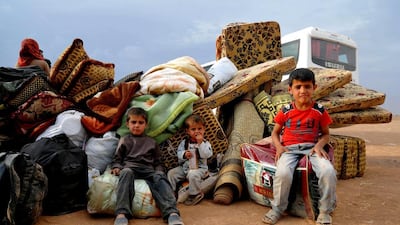Karolina Lisslö is a truly remarkable woman. She is a maths teacher and also the dynamic creative force behind Mattecentrum, an organisation that enlists the help of Swedish maths teachers to provide free help with homework to some 350,000 pupils through an online study site.
In 2016, Ms Lisslö and her colleagues managed to find enough volunteers to translate the course into Arabic because, as she explained to me when we met in Stockholm, mathematical concepts are both universal and useful. Encouraging Syrian and other refugees who have settled in Sweden to go through the Swedish maths course helps them integrate in the country, get jobs and meet local people on a personal level. There's another bonus. Personal contact with people from a very different culture enables ordinary Swedes to understand the hopes, aspirations and difficulties of their new Arabic-speaking neighbours.
I met Ms Lisslö as a result of another remarkable person, Leonard Stall, a British resident of the UAE. His company, Touchline, publishes, among other things, a magazine called Philanthropy Age. Like Ms Lisslö, Mr Stall had a deceptively simple idea. Most people know why we should do good, but have we really understood how to do good? It is the Year of Giving in the UAE, and the generosity of people in the region is well-known. Every major religion preaches in different ways that we have an obligation to help those in need, but he wondered how we can know for sure if our giving is effective. What lessons might be learned from charities, other NGOs, UN agencies, and inspiring individuals like Ms Lisslö? Using many of his contacts through Philanthropy Age, Mr Stall asked an extraordinary range of philanthropists to contribute a short essay on how they tried to make our world a better place. Touchline published the essays in a book called How To Do Good.
__________________
Read more
Sweden turns down 106-year-old Afghan woman's asylum request
End of American dream for one young Mexican immigrant — and thousands more like him
__________________
The contributors include some of the most famous people in the world – actors Matt Damon and Forest Whitaker, Melinda Gates, former US president Jimmy Carter, international footballer Freddie Kanoute, Princess Astrid of Belgium, princess Lamia Al Saud, plus representatives of UN agencies and many others. The contributors are often humble about what they do, explaining what they got wrong at first, and how they learned and improved. Damon wanted to help poor African villages obtain clean water, but he said "half the water projects in the world fail, and I was very aware of that." He decided he needed either to give up or "go for it," so he tried harder and learned from his mistakes. Kanoute said he had been fortunate in the glamorous life of a footballer, but that he knew that God would not be interested in how many goals he scored. His faith in Islam inspired him to think of a legacy he could be proud of, so he built a village as a place of safety for orphans and vulnerable children in his native Mali. Thanks to Mr Stall's organising talents, I was able to join Kanoute, Ms Lisslö and many other wonderful people to help them tell their stories across some of the capitals of western Europe and also in New York city. As Kanoute put it, "sometimes, we say faith is only in the heart. But I don't think that's true. It's in the hands as well."
__________________
More on philanthropy from Opinion
One of the key pillars of this country’s foreign policy is humanitarian relief
Our country works quietly all the time to build a better life for people all over the world
The UAE is committed to fighting polio
__________________
Another inspiring leader on the trip is a young Syrian-Lebanese economist, Dr Rouba Mhaissen. She also did something that seems deceptively simple but has had profound consequences. When the civil war began in Syria, she wondered (almost naively, as she tells it now) if she could do something, anything, to help. She could and did. She went to her homeland, saw the appalling situation so many people found themselves in, asked for help on social media and eventually founded Sawa, an organisation that brings much needed relief to refugees and displaced people from this harrowing conflict. On our short "how to do good" tour, Ms Mhaissen echoed Ms Lisslö when she explained repeatedly that refugees were not some kind of alien threat, but people like you and me. They want what everyone wants: a safe place to bring up a family, work, a home and security.
As a journalist, I have spent years reporting on often difficult and depressing conflicts, on poverty, and the inhuman way we sometimes treat each other. News right now is particularly depressing. Sometimes, UN agencies and charities fall short of what we demand from them. Moreover, across the world, there is resentment about those who are supposedly "not like us", with talk of building walls, cutting foreign aid and declaring charitable giving a waste of money. But there is another story. It's the story of Ms Lisslö, Mr Stall, Kanoute, Ms Mhaissen and many others. They are givers and doers, people who know faith is in the hands and the hearts. They do not shout as loudly as the troublemakers and the haters among us, but they are the quiet heroes of our uncertain world. They know how to do good.
Follow The National's Opinion section on Twitter


